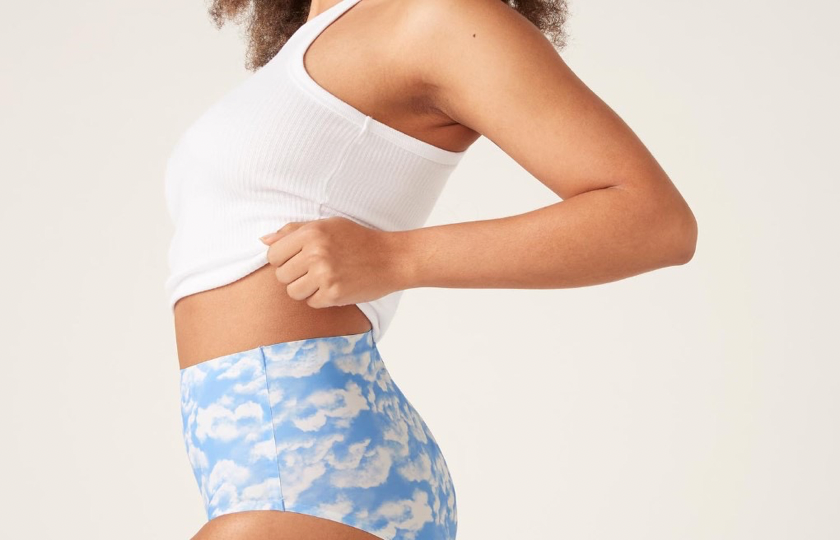Most of my clothes are second-hand or from thrift stores since it’s much more environment-friendly than buying something new. However, when it comes to things as personal as what we wear underneath our clothing, like wearing sustainable underwear – we cannot, of course, wear something worn intimately by others before.
There are a lot of factors to consider when looking for sustainable clothing: longevity, fabric, biodegradability/compostability, resource use, and production emissions, to name a few.
Thankfully there’s a growing number of ethical and sustainable underwear brands that respect both people and the planet. One example is Modibodi, an Australian leakproof underwear company that has since expanded into sustainable underwear, swimwear, activewear and maternity wear.
Viable.Earth “sat down” with Sarah Forde, the head of sustainability and public affairs of Modobodi, and discussed how the company had built its brand to become more environment friendly and its view on sustainability and carbon offsetting.

Forde is in charge of creating products across the company’s supply chain. From fabric selection, manufacturing, and distribution.
“It’s about understanding and looking for improvements of aspects that impact the environment and people,” she explained.
“We are very conscious of our responsibility to make a product that is creating a positive impact, including how we give a platform to the voices advocating for better menstrual health and supporting access to products through donations.”
On building a sustainable brand
The biodegradable range and the recent launch of Carbon Neutral Brief are just the first steps towards responsible innovation and working towards sustainable underwear, said Forde.
“This is a significant and ongoing task but an important one,” she remarked.
“As a company, we are working towards reducing emissions across the supply chain. We’re doing that through the fabrics we choose, designing products for longevity, switching to renewable energy and working with partners to improve their energy choices.”
She explained that the company incorporates a circular design approach using natural fibres and recycled synthetic materials.
“When we look at the impact of textiles, there are benefits of both depending on where in the product’s life cycle. We combine these principles to create products that perform and consider the origin of the feedstock along with its end-of-life pathway.”
Here are just a few of the materials that Modibodi use for its product range:
▪ Bamboo from Forest Stewardship Council (FSC) certified suppliers in China following the CanopyStyle Bamboo Position, which means that the bamboo is grown and harvested in plantations that do not threaten Ancient and Endangered Forests.
▪ Non-mulesed Merino Wool from Australia, sourced from woolgrowers who work to ensure their sheep are healthy and happy and meet the Australian Animal Welfare Standards and Guidelines.
▪ Organic cotton is certified by India’s Global Organic Textile Standard (GOTS).
▪ Recycled nylon from China made from pre-consumer waste.
Sustainable underwear

The sustainable underwear company launched the world’s first biodegradable period and pee-proof underwear in January, made from 97 per cent biodegradable material that can break down in active soil once it reaches its end of life.
“Because they’re made from plant-based materials, the briefs would start to degrade in active soil within four to six weeks,” said Forde. “Modibodi’s Biodegradable Briefs will have completely broken down in three to five years – leaving behind no harmful toxins.”
She added that the company’s biodegradable range was well-received by consumers and that the company has expanded it to include more styles and colours.
On carbon offsetting
Modibodi recently partnered with emission trading startup C2Zero, for its Carbon Neutral Seamfree Full Brief. For every product sold, C2Zero will remove 2.4kg of carbon dioxide equivalent by means of offset.
However, there’s a growing opinion in the sustainability industry that carbon offsets are not a permanent solution. Forde shared that aside from offering carbon-neutral briefs, its range of reusable leakproof underwear is still better in terms of sustainability compared to traditional feminine hygiene products like tampons or disposable pads.
“As a concept, Modibodi’s reusable products are a great option for customers looking to reduce carbon emissions in their daily habits,” said Forde.
“Our Life Cycle Assessment (LCA) to identify the carbon emissions of our leakproof underpants over their entire life cycle for menstrual management, compared to disposable tampons and pads, gave us a baseline to improve upon.”
Modibodi’s analysis found that carbon emissions mostly came from the growing, extracting and processing raw materials into fabrics, followed by the energy used during customer care for washing.
“A reusable pant saves many disposables going to landfills, approximately 430 single-use products for a year,” she added.
“As a result, we’re able to say Modibodi is a better choice than disposable menstrual products to reduce carbon emissions and waste.”
Benchmarks and future initiatives
In September, the company launched an end-of-life recycling pilot where it accepted customers’ used Modibodi underwear which it sent to recycling facilities to be given another life.
Forde said that underwear – especially period undies – are generally not accepted for recycling.
“This is a significant pilot, and we are excited to see the results,” she exclaimed.
For future initiatives, the company’s focus is said to remain on textile waste, while from a social lens, providing a platform for youth to advocate their menstrual health needs.
“Access to products, free from shame or embarrassment and with dignity, power of product choice and confidence to be empowered to be themselves in their body,” Forde concluded.



